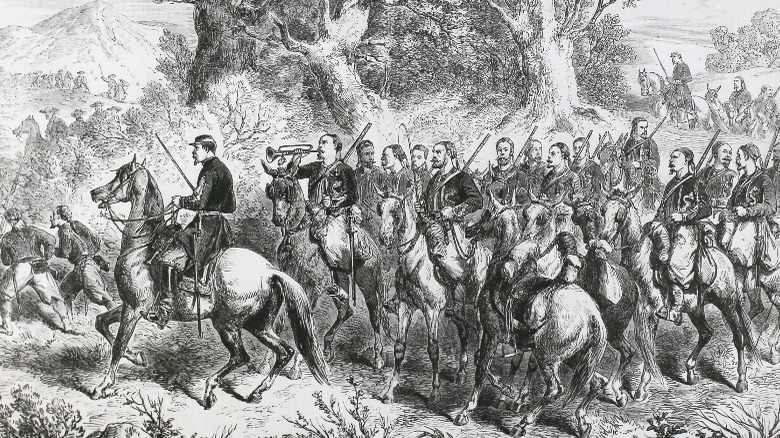The 1838 Pastry War Was No Piece Of Cake
Conflict is an inevitable part of life. Whether it be a disagreement between siblings or arguments amongst groups of friends, people will not always agree on everything. One of the most extreme forms of conflict anyone can experience is that of war. It goes beyond friends and family and often engulfs entire countries and societies.
War is never a good thing, but many have been fought throughout history just the same. Because the cost of conflict is so high, generally speaking, most folks try to avoid it. While there are some situations where military conflict may be the only option, there are others where it is completely unnecessary. And just as there have been many wars fought for noble causes, there are some that have been started over some rather silly things. One such conflict took place during the 19th century between Mexico and France, and though its name conjures images of sweet treats, the Pastry War itself was anything but.
Pre-War Day
The relationship between Mexico and France has been complex, to say the least. Though European colonialism began around 1500 (per Britannica), it was in full swing by the 19th century. Spain had claimed many parts of Central America at various times, but by 1821, Mexico had gained its independence and was looking for recognition from other world nations (via History).
After declaring its independence from Spain, Mexico entered a time of political turbulence while trying to establish a consistent government. During the first two decades of independence, power changed hands around 20 times and got more unstable with each transition (per ThoughtCo). Simultaneously, Mexico's relationship with other European countries was rocky as well. This time of near lawlessness resulted in a lot of chaos not only for Mexican citizens but also for the Europeans who were living and working there. It was this disorder and instability that led to arguably one of the most unusual conflicts of all time.
Demands Go Unanswered
As with many conflicts in life, this particular war was started over money. Yes, this war did also have to do with baked goods, hence the name, but it ultimately came down to the almighty dollar.
According to ThoughtCo, in 1828, things were particularly unstable due to a controversial election. In the midst of the pandemonium that broke out in the streets, many French-owned businesses experienced damages. Notably, a man known as Monsieur Remontel owned a pastry shop that was reportedly looted by military men who were intoxicated and got out of hand. Due to the destruction that was caused to his business and others, Remontel then petitioned the Mexican government for reparations to recoup his losses. In total, he asked for 60,000 pesos, which was a lot to ask of a newly independent country with a government that was already in debt to a handful of other European nations. Because of this, it was assumed that no one would be seeing money anytime soon.
French Response
According to Military History Now, Monsieur Remontel waited about a decade for a response from the Mexican government. None ever came. He then took his concerns to the French government, who, in a bit of a plot twist, took up the case on his behalf. France then asked Mexico for even more money — a total of 600,000 pesos — to replace Remontel's shop. In addition to that ridiculously large sum of money, they took this opportunity to also demand back all the outstanding loans the country owed them, which totaled in the millions.
Ultimately, Mexico did respond to the French demands — by ignoring the calls for reparations and defaulting on all of its loans. France retaliated in November 1838 by sending ships to blockade the Mexican coastline (via ThoughtCo). They also bombed a Mexican fort and took control of the entire Mexican fleet. Mexico then decided that the logical thing to do would be to declare war on the French, and they did so by December.
Mexico Retaliates
Despite having no money, no ability to trade, and no navy, Mexico still chose to take on France anyway. The country used smugglers to try and move products and supplies into the country via a port-to-land route (per Military History Now). Unfortunately for them, Texas cooperated with the French and began apprehending these smugglers, thus hindering Mexico's efforts even further. In a last-ditch attempt to protect its union, Mexico turned to General Antonio López de Santa Anna, despite his failures as a leader and chaotic reputation.
Santa Ana gathered a small number of troops and attacked the French, who were occupying the port of Veracruz (via ThoughtCo). Though they fought bravely, the Mexican fighters were thoroughly trounced by French forces. Despite the definitive defeat, Santa Ana and his men were hailed as heroes anyway. The once disgraced general was even later buried with full military honors.
Conclusion of The Pastry War
So how exactly did such a silly war come to an end? With its port blocked and no other options, Mexico was forced to surrender (per ThoughtCo). With the help of the British, Mexico struck a deal with France, which resulted in the country paying that 600,000 pesos. By March 1839, the French withdrew their forces from Veracruz, and the war was over.
Though barely four months in length, this tiff with one of the most powerful entities in Europe had some serious consequences for the country of Mexico. The fledgling nation had to pay a ton of money it didn't have while trying to rebuild its main port, which had been damaged during the war. The Mexican economy also suffered and was still in the process of rebuilding a decade later when they entered the Mexican American War, which would change the face of the country.





